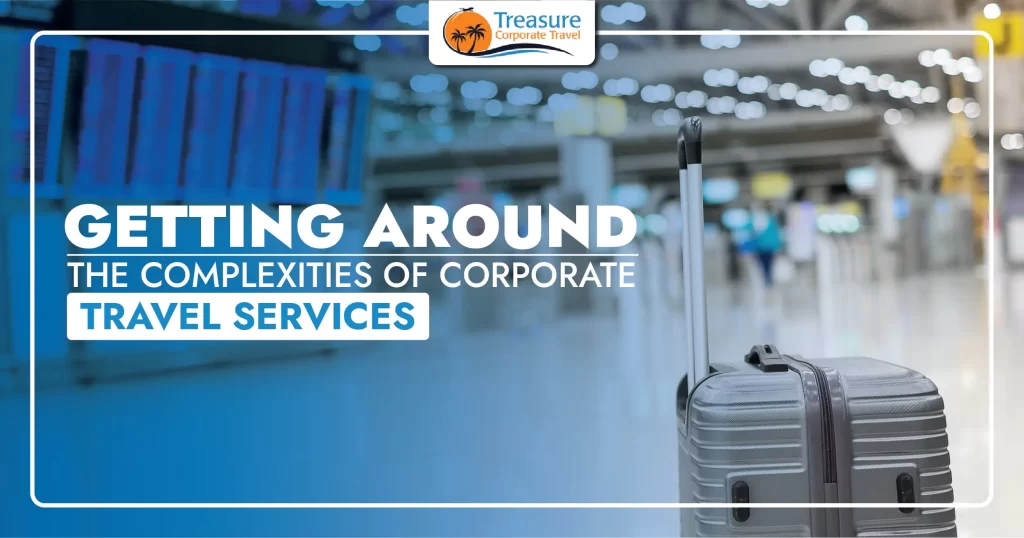Today’s economy requires corporate travel, which is the driving force behind supporting business growth and developing customer relationships. Businesses are using more funds for travel services to boost productivity. They also make sure employees have a hassle-free journey. Corporate Travel Services are designed to be efficient and cost-effective. This is why they handle the logistics, and businesses can then focus on the activities they do best.
The changing nature of corporate travel requires a more complex understanding of its aspects, from scheduling to implementation, compliance, and risk management. As companies maneuver through this flux, it becomes increasingly important to acknowledge the role of travel agents in making sure of a successful outcome. With such a change in corporate travel, many people still do not fully know what corporate travel services are. That is why we have answered some commonly asked questions below!
What is Corporate Travel?
Corporate travel can be defined as travel that businessmen take for business purposes. This travel can involve various activities such as meetings, conferences, client visits, and training sessions. Corporate travel focuses on specific business goals that are often not easily achieved without planning and coordination.
Through such travels, one can build rapport with clients, catch up with other professionals in the industry, or go on team-building trips. The importance of corporate travel is increasing as businesses are increasingly expanding their operations internationally. This makes the adoption of appropriate travel strategies highly important. Moreover, corporate travel features various elements, including company policy compliance, budget management, and traveling safety issues.
What is a Corporate Travels Service?
Corporate Travel Services are exclusive services meant to deal with the travel requirements of businesses and their staff. These services include various aspects such as buying tickets for flights, booking hotel rooms, providing ground transportation, and getting travel insurance. They are your reliable travel partner in making sure that efficiency and cost savings are achieved. After all this, they also help make sure that they are still meeting the specific requirements of corporate clients.
Through the cooperation of travel management companies, companies get access to many tools and experiences. These include supporting superior planning, itinerary management, and compliance with travel policies. These services frequently use modern-day methods like technology to deliver real-time updates, expense tracking, and reporting capabilities. These allow organizations to monitor their travel expenditures effectively.
Additionally, Corporate Travel Services assist companies with managing travelers, offering support, solving problems on the go, and making sure of safety. These services also concentrate on improving the traveler’s experience. As travel logistics become more complicated, these services are quickly becoming all-important for businesses targeted at enhancing travel programs and boosting productivity.
Is Corporate Travel the Same as Business Travel?
Corporate travel and business travel are commonly used interchangeably but have different meanings. Corporate travel is about travel arrangements companies make for their workers to do business-related activities. These include meetings, conferences, client visits, and others to do some training and team-building exercises.
Conversely, business travel can encompass a broader scope of situations, including independent contractors, freelancers, and entrepreneurs traveling for work. Business travel might have less organized planning, and it is the traveler who is responsible for managing their arrangements.
However, corporate and business travel have the same goals. These are developing professional relationships, improving productivity, and growing business. Grasping the subtle differences between the two is important for companies that want to apply travel policies and strategies designed to their own specific needs.
Who Handles Corporate Travel?
Corporate travel is usually handled by different people within a company, and they are important for their staff to have a good journey. These people are known as travel managers or travel coordinators. The travel managers or coordinators are the main point of contact and are in charge of planning travel arrangements. They are in contact with the employees to be sure they are on the same page regarding needs, travel policy, and budget compliance.
In many companies, travel management is done with the help of travel agencies. Through this collaboration, you can get professionals in logistics and negotiation with vendors, and they provide you with very useful tools and technology for efficient booking.
Besides that, the finance departments may also assess travel budgets and expense reporting. They help make sure that expenses align with the organizational goals. Successful cooperation between these parties is important for maximizing the benefits of corporate travel. This increases employee satisfaction and helps with overall savings for the organization.
What Does a Corporate Travel Specialist Do?
A corporate travel specialist plays a major role in managing corporate travel logistics. They help make sure that employees have a seamless experience. Their main role is to organize and arrange everything related to corporate travel. This includes buying tickets for flights, hotels, and ground transportation while sticking to company policies and budget constraints.
Besides booking, a corporate travel specialist offers help, helping travelers through any modifications or problems that may come up during their trips. They stay updated on industry trends, pricing fluctuations, and travel regulations to offer informed recommendations. This allows for making sure of compliance and maximizing cost efficiency.
Another important element in their area of responsibility is managing travel data and analytics. This involves tracking expenses and travel patterns and making reports useful in the decision-making process about travel programs. Corporate travel specialists are key to organizations in finding solutions for corporate travel, and they significantly influence the organization’s travel strategy success.
What Are 3 Things a Travel Agent Does?
Travel agents play an important role in the corporate travel world as they provide specialized services to effectively help the corporate travel process. Here are three important functions they perform:
Booking and Reservations
Travel agents book and ticket flights, make hotel reservations, and arrange ground transportation. They also make sure the travel arrangements align with corporate policy specifications and budget limits. Using their industry connections and tools, they can get the best rates and flight routes from airlines and travel agencies. This saves time and decreases the company’s operational costs.
Itinerary Management
Travel agents develop an elaborate travel itinerary that contains all the information needed. This includes the flight schedule, overnight accommodation details, and the route to be followed by the travelers. Moreover, they constantly contact travelers by making changes if required. For instance, if the flight is delayed, they might shift it to the next flight, or if the flight is canceled, they may find another hotel, and give travelers real-time information.
Expense Management
Travel agents help business firms regulate travel expenditures by providing information on costs, supervising outspending, and generating online reports. This aids in budget organization, keeping the organization in the green when it comes to travel program evaluation. Consequently, it helps in the informed decision-making process, and they have more control over managing the travel program.
Why Do Corporate Travel?
Corporate travel is undoubtedly an important part of the corporate world. It is important for businesses to facilitate growth, bring employees together, and build stronger relationships with their clients. A major advantage of Corporate traveling is the chance for face-to-face communication. Being physically present at conferences and meetings can create relations and opportunities that are difficult to imagine in remote communication.
Corporate travel also allows for employee training and development, as well as the teams’ involvement in workshops and seminars, which are very important in enhancing their skills and knowledge. Regular meetings with the team can create bonds that will improve team dynamics and morale, leading to greater productivity.
Furthermore, suitable approaches to corporate travel can also save the company money. Business travel studies show that companies will earn an average of $12 for every dollar they spend on travel. This emphasizes the financial influence of a carefully thought-out travel program.
What is an Example of Corporate Travel?
Corporate travel can be explained through the example of a company attending an industry conference. Imagine a technology firm sending a team of employees to a trade show in a distant city. This trip comprises several activities:
- Each team member needs to book their flights.
- Hotel accommodations must be reserved near the event venue.
- Local transportation should be organized to facilitate ease of movement during the conference.
Through the trade show, employees can network and engage with potential clients and partners, participate in workshops to improve their knowledge of industry trends and deliver their products and services to a broader audience. This enhances the company’s visibility in the market and provides the necessary information to improve future strategies.
In this context, corporate travel is an important tool for different purposes, such as establishing professional relations, collecting information about the industry, and advertising the company’s products. These kinds of travel experiences can result in considerable business opportunities and the build-up of teamwork, and they become the most important for organizational growth.
What is a Corporate Travel Coordinator?
A corporate travel coordinator is responsible for overseeing and managing the travel needs of an organization’s employees. This position requires the participation of both transportation operators and those who have the ‘big picture’ in mind, so a manager’s travel arrangements should not only comply with the company’s policies but also follow the business objectives set by the company. Coordinators are the travel support communication channel for the employees to obtain information about their trips, helping them understand travel issues that are usual for corporate travel.
Their job is to book flights, hotels, and transportation, manage the planned routes, and solve any travel difficulties. They are in the same boat as travel agencies and vendors who are involved in negotiating favorable rates and securing accommodations necessary for their travel, making sure of cost-effectiveness.
Apart from logistical tasks, corporate travel coordinators also play an important part in making sure of compliance with travel policies and procedures and dealing with travel-related expenses. By implementing data collection and processing tools, coordinators can present a clear picture of the situation with the current travel data to management. Ultimately, their efforts make the journey comfortable and easy for all employees.
What is the Biggest Responsibility of a Corporate Travel Company?
The most significant responsibility of a corporate travel agency is to provide clients with a stress-free travel experience while managing logistics, compliance, and cost efficiency. This refers to a wide range of duties, starting with booking flights and accommodations and ending with providing help to travelers in real time. The travel company is a dedicated partner working towards giving specific solutions to businesses and their employees.
One of their most important duties is to ensure the safety of the travelers and compliance with the company’s travel policies. They do this by being informed of travel regulations, health advisories, and industry trends, which allows them to offer the correct recommendations and risk management strategies.
Corporate travel companies also monitor travel budgets and expenditures and provide organizations with analytics that help them improve their travel programs. By managing these elements, corporate travel companies help businesses minimize interruptions, increase employee satisfaction, and obtain a high return on investment. Their role is significant in the corporate scene today.
Final Note
Corporate Travel Services are essential for every company in this modern era, facilitating effective logistics and promoting key relationships. Corporate travel agencies can precisely plan, apply, comply, and control costs, which allows them to plan travel programs that yield higher productivity and employee satisfaction. Outsourcing travel management has a double punch. Expenses drop while travel quickly becomes more efficient. Many of the business travel trends are about offering travel managers better solutions. Corporations are now more than ever expected to connect with other organizations at any time, anywhere. To meet these new demands, if companies want to keep up with the industry and take advantage of the opportunities created in a progressively globalized world, they have to be masters of those services.




